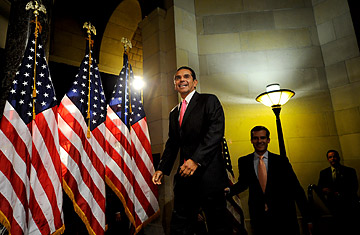
Mayor Antonio Villaraigosa arrives at Los Angeles city hall on Feb. 7, 2012
(2 of 3)
He can undoubtedly move across different ethnic groups, a skill he has perfected in Los Angeles, but the Democrats will most likely use him as a point man in their efforts with the Latino electorate. It is not difficult to see why. One night in late February, in a packed church near the city's airport, hundreds of airport workers complained about their working conditions, wages and health care benefits from some of the employers at LAX, the area's fourth largest employer and the world's sixth busiest airport. They told stories, in Spanish, about a broken safety net — paying high costs for health insurance and then driving to Tijuana, Mexico, where they can afford medication for chronic health problems. People shook their heads forlornly, and some of them cried. They fretted over $10-an-hour wages, the airport's allegedly poor and dangerous working conditions and not being allowed to take water or bathroom breaks.
Villaraigosa, running late, had entered stage left. His dark hair was perfectly coiffed, and he was sartorially impeccable in a dark green suit, lime-green tie and shiny brown shoes. He sat on an honorary pew the organizers placed at the front of the church and he listened to the stories and gave them caring nods. He had some talking-points note cards, gave them a cursory glance and left them on the seat. He took the microphone, not unlike an empathetic talk-show host, and started pacing up the aisle. He said he would first speak in Spanish, then translate his words into English.
"We should never judge people by what they say, we should judge them by what they do. We should stand for the proposition in this great city, the City of Angels, which means a city of love — a city of good people — we ought to stand for the proposition that you can have a potty break, that you can have a lunch break, that you can have a good health care plan and that when you organize a union that's not antithetical to what our great democracy is all about. I don't just talk. I have been standing with workers, with immigrants my entire life. I will stand again. Muchas gracias."
Back in his third-floor office in city hall, Villaraigosa says he is energized and "loves being mayor." National media requests are now coming in fast, and he is being asked to opine on the state of national immigration policy. "If we brought these undocumented people from the dark to the light, it would add to the economy," he says. "What I find amazing is that in a Republican Congress that loves to recall the Reagan years as glory years, it was Ronald Reagan who passed immigration reform, it was Reagan that understood these people are a net plus to the nation. There are ways to do this in which they earn their citizenship." He calls Mitt Romney's opposition to the Dream Act — which would allow illegal immigrants to serve in the military for two years as a gateway to citizenship — "nonsensical." He says he has a lot of respect for Republican Senator Marco Rubio of Florida because he is willing to challenge his own party's views on immigration.
Villaraigosa becomes even more animated when he talks about Los Angeles. Despite his rocky tenure, he remains one of the nation's most influential mayors — he is the president of the U.S. Conference of Mayors — and against tough odds, especially the weak national economy, he claims he has quietly moved forward on his agenda and reached many of his goals.
